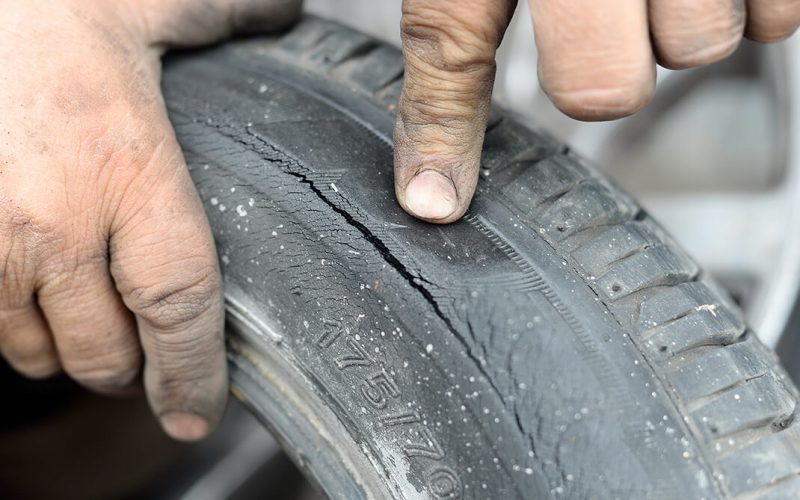The tread depth on your tyres can be an important sign that you need to change them. You should also check for uneven wear. In addition, you should make sure you’re using the correct pressure for your tyres. If you’re unsure, check out these 5 signs to see if you need to replace your car tyres.
Table of Contents
5 signs that point towards the need for a new set of tyres
It is critical to keep your car tyres in good condition if you want to drive safely. Tyres that are too worn will reduce your grip on the road, making it more difficult to steer, and will increase your chances of aquaplaning. They will also decrease your stopping distance, which can cause a blowout.
As mentioned in Youramazingcar.com tires take a beating every time you drive, and over time, they will begin to wear down. Getting your tires replaced in a timely manner is not only good for your car’s performance, but it is also good for your peace of mind. There are several signs that your car needs a new set of tyres. Here are five signs you should look for.
First, check your tyre pressure. If it’s low or too high, it might be time to replace them. You should also check your tread for wear indicators. These indicators are evenly distributed through the tire grooves, and they become more visible as a tire approaches its end of life.
Another sign that your car tyres need to be replaced is cracked on the sidewall. While cracks are easily visible, bulging sidewalls can be difficult to spot. It’s important to replace your tires as soon as you notice these signs.
Checking for uneven wear
When changing car tyres, it’s important to check for uneven wear on your tires. It’s common for uneven wear to result in reduced grip and control, which may affect your driving. Uneven wear can also increase the stopping distance of your car. In order to avoid the problem, you should have your car inspected by a certified service provider who will determine the source of the uneven wear.
Tires can suffer uneven wear if their pressure is not evenly distributed. The suspension system of your vehicle is a key component to keeping the wheels and tires securely in place. Uneven tire wear can be caused by uneven tire pressure and may affect the way the car handles. If this is the case, a professional should check your suspension system to ensure it is in balance.
Uneven tire wear may also be caused by misaligned wheels. Changing your car tires should be done on a regular basis. Tires that have uneven tread wear are often unsafe and should be replaced as soon as possible. Uneven wear also affects the steering and suspension, which may affect your driving and safety.
Uneven tire wear can result in uneven cupping, which is an irregular pattern of wear. These irregularities can result in excessive vibrations and odd rolling noise. It can also lead to alignment problems, which will require steering wheel correction. If the wear is too extreme, you should replace your vehicle’s suspension. There are some simple things you can do to prevent uneven wear. So, the next time you change car tyres, be sure to check your wheels and check for irregular wear!
While it may not be possible to read your tires’ tread, you can still try to guess the future by reading the pattern. Tire treads should have a uniform pattern and depth. You can use a tread depth gauge to determine if the tread depth is too shallow or too deep. This gauge allows you to test the depth of your tire tread in several different areas. You can use the results to determine what is safe and what is unsafe.
Finding the correct pressures for tyres
Checking the pressures of your car tyres is an essential part of vehicle maintenance. It’s recommended that you check them every two weeks and before long trips or heavy loads. To get the most accurate reading, use a gauge that’s calibrated for car tires. If you don’t have one, buy one at a local auto store or use one for free at the petrol station.
The recommended tire pressure for a car varies with make and model. It’s often stated on a sticker inside the driver’s door or in the owner’s manual. Generally, the recommended tire pressure for a passenger car is 32 to 35 psi. However, some vehicle manufacturers recommend a higher pressure for winter tires.
Checking the pressures of car tyres is an important part of maintenance because it affects gas mileage and vehicle performance. The correct pressure for your car’s tires is listed on the door of your vehicle, and it’s best to follow these recommendations to ensure safe driving.
The correct pressure for your car tyres is important to ensure maximum cornering and braking performance, as well as a longer life for your car tyres. Checking the pressures of your car tyres is easy, and a gauge is an important tool in this process. Several websites offer inexpensive tyre pressure gauges.
Correctly inflated tyres save fuel and improve the performance of your car. Underinflated tyres will result in uneven contact with the road, which will cause rapid tyre wear. Moreover, the wrong pressure will reduce fuel efficiency and increase CO2 emissions.
Keeping tyres in good condition
It’s important to know how to maintain your car tyres in order to prevent serious problems. Luckily, there are a number of simple ways you can keep your tyres in good condition. Here are some tips that you can use: Ensure that your tyres are always changed, check for serious problems and check the pressure regularly.
Make sure that you store your car tyres in a cool, dry place. You can use jack stands to do this. You should also rotate them regularly and keep them inflated to the correct levels. Additionally, check the tread depth periodically to prevent them from wearing down.
Your car tyres are one of the most important parts of your vehicle, and poor tyre condition can lead to costly repairs. Worn-down tyres can even make driving dangerous. They can cause your car to skid off the road, which can lead to an accident. If you want to keep yourself and your passengers safe, you should regularly check your tyres. If you notice any signs of wear, you should replace them as soon as possible.
Another way to keep your car tyres in good condition is to store them indoors. If you can’t put them in your car, consider storing them in an air-tight plastic bag. This way, you can prevent them from drying out and getting damaged by the sun. In addition, you should store them in a climate-controlled room to protect them from UV rays and ozone.


